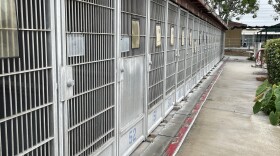REBECCA ROBERTS, host:
Welcome back to ALL THINGS CONSIDERED from NPR News. I'm Rebecca Roberts. After a quarter-century of civil war, Sri Lankans are facing a challenge today that many have never seen, the prospect of peace.
Yesterday, the president of the island nation off India declared victory over the Tamil Tiger rebels. Today, the rebels conceded defeat, and there are reports that some rebels staged last-ditch suicide attacks against government troops.
On the line with us now is Gordon Weiss. He's a spokesman for the United Nations, and he's in Sri Lanka's capital, Colombo. Welcome to the program.
Mr. GORDON WEISS (Spokesman, United Nations): Thank you.
ROBERTS: What is the feeling today on the streets of Colombo?
Mr. WEISS: Oh, I think there's a lot of excitement at the idea that this long war is coming to an end. As you said, many Sri Lankans have known nothing else except strife all their lives. So, there is justifiable excitement, I think.
ROBERTS: The rebels' last stand was on a tiny patch of land, where as many as perhaps 100,000 refugees were being held. The government says they're being released today. What are you hearing about them?
Mr. WEISS: Well, the combat is not over yet. There is still apparently a group of Tamil Tigers who are holding out. We don't know the proportions of this last piece of the battle. We get reports from the army. They are also providing us with reports of the numbers of people who have managed to escape from the combat zone.
Those reports at the moment vary between 55,000 and 80,000 people who have managed to get out so far, but their insight is somewhat limited by the fact that we have no access there, humanitarian workers, and nor do journalists, of course.
ROBERTS: So, with no outsiders allowed in that area, no journalists, no aid organizations, when and how do you expect to get a clearer picture of what is going on there?
Mr. WEISS: Well, I think in many ways we never will. I mean, the victor always writes the history, of course. It must have been a terrifying place to be. But we'll get a much better picture, I suppose, once this is over and once people are writing the stories of what happened.
ROBERTS: Have you heard any stories from people who have managed to make it out?
Mr. WEISS: No, those people are under the custody of the army of Sri Lanka at the moment. They're on their way to internment camps in the north of Sri Lanka. We have a pretty good picture from an earlier outflow of people that conditions, as people were besieged in this tiny patch of land, were pretty terrible.
They have very little supplies of food and medicine, there was daily fighting, daily small-arms fire and artillery fire. The U.N. estimates that thousands of people were killed and wounded over the last few months, civilians. We know from the civilian population who came out that there was a very wide range of battlefield casualties.
ROBERTS: How does a country that has been at war with itself for 25 years even start thinking about the future?
Mr. WEISS: Well, I think that's a huge question and no easy answer. The first thing, I suppose, is to determine if the Tamil Tigers are truly finished, or do they preserve any capacity to mount urban terror operations or jungle warfare.
The second thing is to determine if a political solution is in the offing and whether that will take the wind out of the sails of the Tamil Tigers. And the final thing, I suppose, is that I imagine the government of Sri Lanka will be looking at maintaining pretty close security on the areas out of which the Tamil Tigers traditionally operated in the north of Sri Lanka.
That somewhat flies in the face of the democratic traditions of this country, and marrying those two competing tendencies is going to be difficult. It's going to be difficult for any government to strike a balance.
ROBERTS: Gordon Weiss is a spokesman for the United Nations. He joined us from Colombo, Sri Lanka. Thank you so much.
Mr. WEISS: You're welcome. Thank you. Transcript provided by NPR, Copyright NPR.





